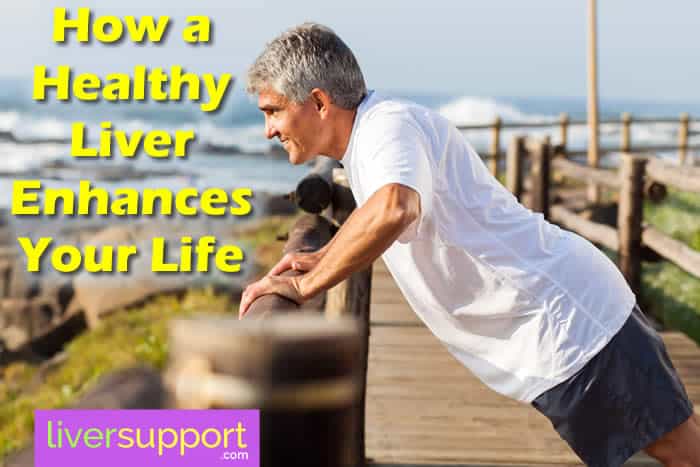
Previous
An Ancient Chinese Secret for Supporting Your Liver

Next
How Liver Disease and Depression Can Impact Relationships and Sexual Function
How a Healthy Liver Enhances Your Life
While you may know how a compromised liver can impact your body, it’s equally important to know the benefits of a healthy one, and how it improves your life.
It’s a no-brainer to say you need a brain. You know that, just like you know you need a heart, a lung (or two) and a liver. But there’s a difference between knowing something and understanding it. In this respect, our bodies are a lot like our cars: As long as everything’s working, most of us don’t give the inside a second thought. It’s a different story if you’re a doctor (or a mechanic), because it’s your job to diagnose problems. For the rest of us, even on those rare occasions when we pop the hood, we have no idea what we’re looking at.
The human body is such an incredible machine that it functions even without a user manual.
Obviously, you know the basics:
- you sleep when you’re tired,
- eat when you’re hungry,
- and feel pain when you’re hurt.
While you may know how a compromised liver can impact your body, it’s equally important to know the benefits of a healthy one, and how it improves your life.
Today, we’ll examine the ins and outs of this essential organ.
What Does Your Liver Do?
If you’re an average adult, your liver is about the size of a football. It is the largest solid organ in your body and is protected behind the lower ribs of your ribcage. It has a lot of jobs (about 500 or so) but, for the most part, it serves as your body’s filtration center. Whatever you eat or drink, the liver has to deal with it.
From the outside, eating a meal is a straightforward process: food goes in, waste goes out. A healthy liver keeps that process going by filtering the toxins that result from digestion. If you eat protein, such as meat or nuts, the bacteria in your intestines will break that down into amino acids. A toxic byproduct of this reaction is ammonia, which the liver turns into urea and then delivers to the kidneys (and a one-way ticket out of your body).
Your liver doesn’t just filter out waste; it also regulates the nutrients in your bloodstream. Vitamins and minerals that pass from your intestines into your blood will be converted into forms your body can use, while carbohydrates are broken down into glucose. Think of glucose as the fuel that powers your cells. The liver will store this fuel for when your body needs it, such as when your blood sugar drops.
Your liver also converts fat into energy by producing bile. This yellow-green goo isn’t pretty, but your liver will make about 800-1,000 ml of it per day.
5 Signs of a Healthy Liver
There are a number of outward signs that mark a healthy liver:
- increased energy levels
- clear skin
- good digestion
- a strong immune system
- and (for women), a more regular menstrual cycle
6 Signs of an Unhealthy Liver
If your liver is impaired, you’re more likely to be:
- fatigued
- have difficulty concentrating
- experience a loss of appetite
- nausea
- bloating
- and constipation
These symptoms can range from annoying to debilitating, but it’s possible to reverse them by changing your diet. Moderating your intake of alcohol and caffeine, avoiding over-processed foods (including refined vegetable oils, sweeteners, and artificial ingredients), and cutting down on sugary drinks and snacks can make a world of difference.
Be aware that a damaged liver will result in more extreme symptoms, such as chronic fatigue, vomiting, dark urine and jaundice.
5 Ways to Improve Liver Health
Your liver must filter whatever passes through your digestive system. Improving your liver health isn’t just about avoiding bad food; it’s about seeking the best food for your body.
As recommended by the American Liver Foundation, you should seek a balance of the major food groups.
- Get your fiber from fresh fruit and vegetables, whole grains, rice, and cereals.
- Healthy proteins come in the form of low-fat dairy, lean meat, beans, legumes, and lentils.
- Healthy fats can be found in nuts, seeds, avocado, and fish oil.
- Monitor your sugar and salt intake and, as always, drink lots of (non-alcoholic, non-caffeinated, non-sugary) fluids.
- Supplements like milk thistle can repair your liver and improve its function.
This may not be a surprise. Eating right, exercising regularly, and getting enough sleep are common recommendations from health professionals. But that’s because these steps help your complex insides do their job more efficiently. When you eat right, your liver won’t struggle to filter the toxins in your body. When you exercise regularly, you improve the cardiovascular system that the liver relies on. And when you sleep, that’s the crucial time your body uses to reset.
Hopefully, this will give you some insight into what’s going on underneath the hood of that incredible machine you call your body.
Asp, Karen (2018). 8 Questions You Should Be Able to Answer About Your Liver. Retrieved on 3/18/18 from https://www.everydayhealth.com/news/facts-about-your-liver/.
How to Improve Liver Function in 6 Steps. Retrieved on 3/18/18 from https://draxe.com/liver-function/.
PubMed Health (2016). How does the liver work? Retrieved on 3/18/18 from https://www.ncbi.nlm.nih.gov/pubmedhealth/PMH0072577/.






